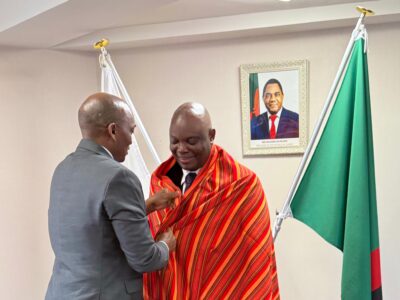The International Monetary Fund (IMF) Executive Board has completed its fourth review of Zambia’s 38-month Extended Credit Facility (ECF) arrangement, approving an immediate disbursement of SDR 139.88 million (approximately US$184 million).
This brings Zambia’s total disbursement under the ECF programme to SDR 992.86 million (about US$1.3 billion).
The ECF arrangement, which was approved in August 2022, aimed to support Zambia’s fiscal and structural reforms, focusing on macroeconomic stability, fiscal sustainability, and inclusive growth.
This is contained in a statement issued in Lusaka on Monday.
However, Zambia’s economic outlook has been significantly affected by a historic drought that has led to a contraction in agriculture and electricity production.
As a result, the IMF has revised its growth projection for 2024 downward to 1.2 percent, from an earlier forecast of 2.3 percent.
Despite these setbacks, IMF Deputy Managing Director, Nigel Clarke, emphasized Zambia’s progress in implementing economic reforms.
“Programme performance remains satisfactory, and the authorities have shown resilience in the face of unprecedented challenges. The severe impact of the drought has slowed growth and contributed to rising inflation, but Zambia remains committed to restoring fiscal and debt sustainability,” Clarke said.
The IMF’s review highlighted that Zambia met most of its fiscal targets, although two key performance indicators were missed.
The June 2024 target on clearing expenditure arrears and the September 2024 target on social spending were not met by a small margin.
Additionally, five out of fifteen structural benchmarks were not achieved, though two were completed with minor delays.
In a statement, Clarke also noted the need for continued fiscal consolidation and prudent monetary policies.
“Fiscal consolidation, reserve accumulation, and exchange rate flexibility will be essential for safeguarding Zambia’s macro-financial stability.
The Bank of Zambia’s data-dependent approach to monetary policy would help preserve inflation targeting credibility,” he added.
While Zambia’s public debt is considered sustainable, the IMF warned that the country remains at high risk of overall and external debt distress.
Zambia’s debt sustainability has been bolstered by the successful completion of a Eurobond exchange and agreements with official bilateral creditors.
However, the IMF emphasized the need for continued fiscal discipline and structural reforms to ensure long-term debt sustainability.
“Zambia is at high risk of debt distress in the near term, but we expect the country to achieve a moderate risk of external debt distress over the medium term,” said Clarke.
Looking ahead, the IMF stressed the importance of improving governance and transparency, particularly in the energy sector, to foster private sector activity and economic diversification.
Clarke underscored that reforms in agriculture, energy, and anti-corruption measures would play a key role in building climate resilience and supporting inclusive growth.
Zambia’s government has reiterated its commitment to supporting vulnerable households and advancing fiscal reforms despite the challenges posed by the drought.
“We remain focused on stabilizing the economy and protecting the livelihoods of the most vulnerable, even as we work to address the impact of the drought,” Zambian Minister of Finance, Situmbeko Musokotwane said.
The IMF’s approval of the US$184 million disbursement is a critical step for Zambia as it navigates these economic challenges and works towards achieving its long-term development goals under the ECF-supported programme.
WARNING! All rights reserved. This material, and other digital content on this website, may not be reproduced, published, broadcast, rewritten or redistributed in whole or in part without prior express permission from ZAMBIA MONITOR.












Comments